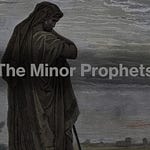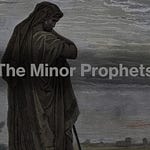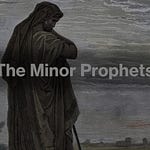For Christians and non-Christians alike, it would be hard to argue against the fact that Jesus Christ has been the most impactful man in all of history. Culture, politics, art, science, and almost every single sphere of our existence has been affected by the Nazarene born 2,000 years ago. But for the disciple of Christ, he is infinitely more than just an impactful man: he is our Lord and Savior, God incarnate, the prophesied Messiah. He is everything, our all in all.
We may know these things, but do we know why they matter? Could we explain them? Most importantly, do we know him or simply know facts about him? The aim of this post is to provide some high-level answers to these questions and hopefully lead you to seek after Christ more and more. To do so, we will be looking at John 1:1–18 and looking into first, the person of Christ, and then second, the work of Christ. So before going any further, read through John 1:1–18, and then we’ll move on to the person of Christ.
John 1:1–18
1 In the beginning was the Word, and the Word was with God, and the Word was God. 2 He was in the beginning with God. 3 All things were made through him, and without him was not anything made that was made. 4 In him was life, and the life was the light of men. 5 The light shines in the darkness, and the darkness has not overcome it.
6 There was a man sent from God, whose name was John. 7 He came as a witness, to bear witness about the light, that all might believe through him. 8 He was not the light, but came to bear witness about the light.
9 The true light, which gives light to everyone, was coming into the world. 10 He was in the world, and the world was made through him, yet the world did not know him. 11 He came to his own, and his own people did not receive him. 12 But to all who did receive him, who believed in his name, he gave the right to become children of God, 13 who were born, not of blood nor of the will of the flesh nor of the will of man, but of God.
14 And the Word became flesh and dwelt among us, and we have seen his glory, glory as of the only Son from the Father, full of grace and truth. 15 (John bore witness about him, and cried out, “This was he of whom I said, ‘He who comes after me ranks before me, because he was before me.’”) 16 For from his fullness we have all received, grace upon grace. 17 For the law was given through Moses; grace and truth came through Jesus Christ. 18 No one has ever seen God; the only God, who is at the Father’s side, he has made him known.
Who Christ Is
Perhaps no other passage in scripture than John 1:1–18 best outlines who Jesus Christ is. What is clearly outlined here is that, as the Chalcedonian Creed said in 451 AD, Christ is “truly God and truly man.”1 In reference to the former, Christ is completely, utterly, and fully God; he is YHWH, the eternal one. Look back at the passage and see some of John’s statements about Jesus.
He is God himself. Verse 1 explicitly says that “the Word [Christ] was God.” Jesus is the same God that called Abraham and spoke to Moses from the burning bush. He is not a demigod or a sub-god; he is the only true God.
He is eternal. Verses 1–2 state that “In the beginning was the Word, and the Word was with God, and the Word was God. He was in the beginning with God.” Harkening back to Genesis 1, John points us to the reality that the Word has always been. He is outside time and has eternally existed.
He is the creator. Verse 3 says “All things were made through him and without him was not anything made that was made.” When God spoke the world into existence, the Son of God did so. He is uncreated, created all things, and “the world was made through him” (Jn. 1:10).
And also, going back to the Chalcedonian Creed, he is truly man. That is, Jesus was a fleshly man, he was legitimately born from Mary’s womb, and he ate, drank, and felt just like a man would before dying as only a man can. Notice from the text the fleshliness of the Word.
He was clothed in flesh. Verse 14 says that “the Word became flesh.” The second person of the Trinity did not stop being God when he came to Earth; yet he truly did take on our flesh.
He walked among humanity. Verse 14 continues and says that the Word “dwelt among us.” Jesus was actually present with humanity, walking and talking with us. He was not a ghost or a figment of the imagination.
This reality—Christ’s true deity and true humanity—boggles the mind. But why should such a lofty and mysterious reality matter to you and me? Quite simply, our salvation depends on it. See, the Christ had to be God so that he could live the perfect life to be the sacrifice for our sins. And he had to be God to resurrect from the grave, as no human can defeat death and resurrect themselves. However, the Christ had to be truly man as well, as only a man can shed his blood and die. Furthermore, only a man can represent humanity before God; Jesus came to be our mediator, our representative, to reconcile us back to God.
Who Christ is matters. John placing this section right at the beginning of his book is meant to help his reader interpret all Jesus will say and do. This is not a created being talking or a deity-like figment of the imagination. This is the God-man, and we are to listen to and respond to him as such.
What Christ Did
Why does it matter that we understand if Christ is who he says he is? Why did he come? What did he accomplish in his life, death, and resurrection? One can break out the work of Christ into 3 distinct ideas as seen in the text.
First, Christ came to defeat death and darkness and give life and light to a world in desperate need. Look at verse 4, where John writes that “In him was life, and the life was the light of men. The light shines in the darkness, and the darkness has not overcome it.” (Jn. 1:4–5). Apart from the creator God, there is no life and no light. Said in the negative, there is only death and darkness, a world without hope. But Christ has come to re-create a hopeless world and bring life, goodness, holiness, and righteousness into it. His mission is to restore what sin has broken on a global scale and in your life individually.
Second, Christ came to save his people from their sins. In verse 12, John says that for all who “believe in his name, he gave the right to become children of God, who were born, not of blood nor of the will of the flesh nor of the will of man, but of God.” (Jn. 1:12–13). All who believe in Jesus Christ as Savior and Lord, are spiritually born again. This is not a physical rebirth but a spiritual one which is humanity’s greatest need–to be forgiven and reconciled to God. And Christ does this all through grace alone, not by our merits, as “grace upon grace” (Jn. 1:16) is given to us through him. Being born again through him assures us of the love of God and eternal life with him.
Third, Christ came to restore the knowledge of God to humanity. In the Garden of Eden, humanity knew God. However, one of the devastating effects of sin is that we no longer know our creator; we are alienated from him and actually do not want to know him in our sinfulness. This lack of knowledge is equivalent to being blind; no matter the beauty or splendor in front of us, we cannot respond one bit, as we do not have eyes that can see. Yet Christ came to heal our blindness. John writes in verse 18 that, “No one has ever seen God; the only God, who is at the Father’s side, he has made him known.” What love Jesus has for us, that despite our vast inability to see the Father, he came to show us who the Father is. Knowing our weakness, he came physically as a man to teach and show us the character of our God in a way we would understand. God desires that you know him and that is solely accomplished through Christ.
Doxology
All theology should lead to worship. Hence, when we learn about who Christ is and what he did, we are not learning facts to puff up our personal knowledge. We have the blessing and honor of seeing God in his beauty and then responding appropriately. When we see Christ, we see God. As Michael Reeves has said, “There is no God in heaven who is unlike Jesus.”2 So when we see Christ putting on flesh in order to die in our place or coming down in love so that we would be freed from our utter enslavement to lawlessness and evil, we see the heart of the triune God. It is not as if Jesus is the loving one and the Father and the Spirit are distant or even antagonistic; no, what we see in Christ is true of all three persons of the Trinity.
Therefore, as we know Christ more and more, we know God more and more. Jesus’ holiness, justice, goodness, grace, and truth, recorded for you in the Scriptures, is the exact imprint of the nature of God. So, as Christ came to lovingly overcome the power of sin in your life, to forgive you from the punishment that you deserve, and to restore your knowledge of God, we see the united will of the Father, Son, and Spirit at work. This means that no matter what happens in your life—sin, trials, and despair—you can look to the love of Christ proclaimed on the cross and know that your God is for you and will never forsake you.
Discussion Questions
How does the person of Christ affect your obedience to him? How does it change or confirm your view of Christ?
What is so important about knowing God? How does Christ relate to this?
How would you respond to someone who claimed Jesus is the loving God and the Old Testament God is the wrathful God?
What are some other reasons for Christ coming to earth, dying, and rising again that you have been taught?
What are some ways you can apply these truths? Think about your mind, how you love other people, your worship, and more.
Michael Reeves, Rejoicing In Christ (Downers Grove, IL: InterVarsity Press, 2015), 14.












